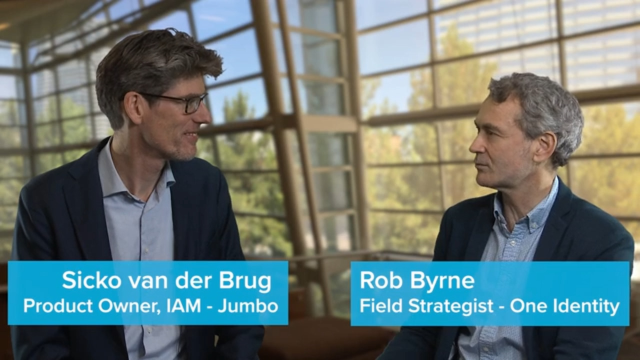Netherland’s second largest supermarket secures identities
 13:37
13:37
Related videos
CEO keynote: Mark Logan - State of the Business
Listen to Mark explain the future vision of the organization and hear why we're the identity security company to partner with.
03:49
One Identity approach to AI in cybersecurity
Larry Chinski, VP of Corporate Strategy at One Identity, explores the dual nature of AI in cybersecurity, highlighting how the company leverages predictive AI t...
03:20
One Identity UNITE San Diego
Get a glimpse into the kind of fun you won't want to miss at our next UNITE conference party!
00:14
One Identity UNITE is heading to San Diego and Prague
Hear from Patrick Hunter, Co-Chair of One Identity UNITE, on what events we have coming up and why it’s the identity security event you simply can’t miss.
00:36
Securing your identity: The power of One Identity and Intragen partnership
Explore how Intragen and One Identity join forces to revolutionize identity security. In this short video, discover how Intragen helps clients map out their ide...
04:11
One Identity named leader in 2024 KuppingerCole Leadership Compass
Larry Chinski, One Identity VP of Corporate Strategy, explains why One Identity has been recognized as a leader in the 2024 KuppingerCole Identity Fabrics Leade...
00:36
Minimizing Your Enterprise Attack Surface
An enterprise attack surface is a sum of the entry and access points to your organization. Join Robert Byrne, One Identity Field Strategist, as he explains the ...
14:44
Reduce the Noise to Secure Your Environment
In an era of endless data, being able to zero in on the information that really matters is crucial to avoid security risks and breaches. You’ll discover how to ...
17:21
Why Attend One Identity UNITE 2025? OneLogin Access Management solutions
See how we are integrating OneLogin access management solutions into the market’s only unified identity offering. Attend to accelerate and secure employee and c...
00:29
Why Attend One Identity UNITE 2025? Learn Privileged Access Management best practices
Your admins hold the keys to your IT kingdom. Their access can keep your organization running smoothly or – if compromised – can bring it to a devastating stop....
00:29
Why Attend One Identity UNITE 2025? Build your cybersecurity knowledge
Identity security is at the forefront of protecting your organization. Join us to learn from industry experts and enhance your technical and business knowledge ...
00:29
Why Attend One Identity UNITE 2025? Explore Prague!
Enhance your identity security knowledge while also getting the chance to explore the historic and enchanting city of Prague! Register today to learn, innovate ...
00:29
Why Attend One Identity UNITE 2025? Enhanced business leadership
Technology is great, but a smoothly run organization can take that technology and do great things with it. Attend One Identity UNITE to experience our business-...
00:29
Why Attend One Identity UNITE 2025? Strengthen your IGA knowledge and strategy
Your identity security strategy isn’t foolproof until all your users (whether they’re on-prem, in the cloud or both) are properly managed. Attend to move your g...
00:29
One Identity UNITE 2024 | San Diego , California
Don’t miss One Identity UNITE in San Diego! Our Madrid conference sold out in record time, so don’t wait – register now for One Identity UNITE.
01:41
